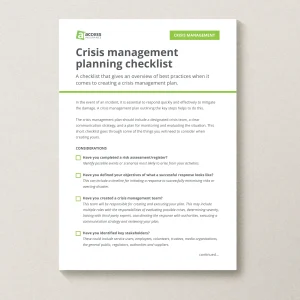
Managing your charity’s reputational risks
This guide looks at the importance of managing your organisation’s reputation and the risks that threaten to harm reputation, some of the consequences, and practical steps you can take to minimise the causes or effects of those risks.
Here are the pieces we will cover:
- What is your reputation, and why is it so important?
- Reputational risks
- Further consequences of a damaged reputation
- Responding to crises
- Managing reputational risk effectively

What is your reputation, and why is it so important?
Reputation refers to the perception that people have of an organisation. This perception is based on the organisation’s actions, behaviour, and communication. These actions and behaviours will include, for example, how they treat their employees, deliver their services or programs, and interact with their stakeholders. To some extent, communications can also help control people’s opinions and perceptions of a charity, for example, by building trust with stakeholders when reporting on outcomes, celebrating staff successes or filing a professional annual report.
A strong reputation will stand an organisation in better stead for attracting funding, partnerships and support. On the other hand, a damaged reputation can have severe consequences for an organisation. Negative media coverage, scandals, or legal issues can all contribute to a loss of trust and support from stakeholders. This can lead to declining donations, losing funding, and difficulty attracting new supporters or partners. In some cases, a damaged reputation can even lead to the organisation’s closure.
Therefore, it is crucial for organisations to actively manage their reputation, including monitoring and responding to feedback from stakeholders, planning a crisis response plan and taking steps to address any issues or concerns.

Reputational risks
Reputational risk can occur as a result of other risks materialising. This could include a breach of duty, conflict of interest, financial mismanagement or cyber attack. Below are some of the typical events that pose a risk to your reputation.
- Financial errors or misconduct
Whether malicious or not, trustees and senior leaders risk eroding trust with donors and beneficiaries if funds are mismanaged. Unexplained use of funds, or seemingly not used in the charity’s best interests, may raise questions about its effectiveness, efficiency and ability to deliver on its mission. - Safeguarding failures, allegations of abuse or misconduct
Both allegations and instances of safeguarding failure, abuse or misconduct can severely impact reputation. These can negatively affect the organisation’s ability to protect or manage stakeholders effectively. - Data breaches
A data breach, which can occur in a digital or physical setting, and may involve the loss or misuse of forms or records, can damage a charity’s reputation by compromising the privacy and security of beneficiaries or donor data. See our cyber guide for more details. - Conflicts of interest
A conflict of interest can lead to negative perceptions of poor governance or lack of accountability/transparency of decision-makers. - Non-compliance with regulations
The inability to comply with regulations such as filing annual reports and adhering to GDPR or fundraising standards can reduce trust with current or potential stakeholders. - Association with influential partners, funders or endorsers
Both companies and individuals that charities partner with can pose a risk to the charity’s reputation if the other party becomes involved in a scandal or controversy inconsistent with the charity’s values or mission. - Inappropriate or offensive conduct by staff or volunteers
Again, this comes down to effectively managing staff and volunteers based on values. Inappropriate conduct can raise questions about the charity culture, governance, risk management or safeguarding controls. - Negative publicity
There doesn’t necessarily have to be a failure in compliance, governance or misconduct to gain negative media coverage. A decision on a controversial issue or questions about an approach taken or even individual stakeholders can be the subject of negative press, creating negative perceptions of the charity’s values or mission. - Inappropriate social media use
Similar to misleading marketing and promotions, using social media can amplify issues or opinions of representatives that may have a negative impact on the organisation. Data or safeguarding breaches could also occur if there are no guidelines on what can be shared or communicated. - Environmental or social issues
Charity operations can cause harm to their reputation if they are perceived to harm the environment or society. Depending on the mission and values of the charity, there could be inconsistencies that may lead to controversy. - Allegations of discrimination
A charity’s reputation can be hurt if negative perceptions surrounding diversity, equality and inclusion policies and practices exist. Formal allegations of discrimination will have a more severe impact and involve legal costs. - Misleading communications
When marketing their work, charities may make claims about their previous impact or how funds will be spent. If these are inaccurate or are later found to have been misleading, this can damage their reputation, eroding perceptions of honesty and transparency.
Further consequences of a damaged reputation
If these risks are made a reality, there can be serious consequences. Trust can be eroded and reputation damaged, but knock-on effects can further threaten an organisation’s reputation.
This could be the withdrawal of funding from donors and funders who lose confidence in the charity’s ability to manage its affairs effectively. This, in turn, can lead to financial difficulties for the charity, making it harder to carry out its programmes and initiatives.
Reputational risks can also result in increased scrutiny from regulators, media outlets, and the general public. It can also result in staff morale and talent loss, as employees may become disillusioned and leave the organisation.
In some cases, reputational or associated risks can result in legal cases, which can be costly and time-consuming for charities to defend. In addition, legal action can result in further negative media coverage, leading to even more significant reputational damage. Ultimately, the consequences of realised reputational risks can significantly impact a charity’s ability to deliver on its mission and achieve its goals. This is why charity leaders must identify, manage and protect their organisation’s reputation.

Responding to crises
In the event of an incident, whether reputational or not, it is vital to respond quickly and effectively to mitigate the damage. A crisis management plan outlining the key steps helps to do this.
The crisis management plan should include a designated crisis team, a clear communication strategy, and a plan for monitoring and evaluating the situation. (See our checklist below for more considerations.) This helps ensure that the charity is prepared to respond quickly and effectively to any reputational risks, minimising the impact on its reputation and ability to carry out its mission. By responding proactively and transparently, charities can demonstrate their credibility and trustworthiness, which can even have a net positive impact.

Download our Crisis Management Planning Checklist
Managing reputational risk effectively
Before there is an even incident to respond to, here are some steps you can take to manage your reputation and reduce reputational risk.
- Adding reputational risks to your risk register
Charities should ensure reputational risks are appropriately reflected in the charity’s risk register. This can help ensure that controls and response plans are in place so that you can respond quickly in a crisis. The risk register should be reviewed regularly and updated to reflect changes in the charity’s activities, circumstances or regulatory requirements. - Appropriate insurance
It’s important to consider the severity of the reputational risks that your charity may face and discuss with your insurance specialist what type of cover is suitable for you. Insurance policies help protect against some of the reputational damages that occur due to a broader issue. For instance, cyber insurance can cover costs associated with data breaches and PR crisis communication. Abuse cover and liability insurance can cover costs of damages arising from allegations of misconduct, malpractice or abuse. Employment practice liability insurance can help cover legal costs associated with accusations of discrimination or harassment. - Planning ahead
Part of the exercise of identifying and managing risks will lead to anticipatory actions such as scenario planning or crisis management plan. - Practising good governance
Good governance is essential for maintaining a charity’s reputation. Charities should have clear policies and procedures for decision-making, risk and financial management, ensuring care, prudence and compliance with relevant laws. This will involve establishing guidelines and policies that protect and build a strong reputation. These include data protection, safeguarding, whistleblowing and conflicts of interest policies. For example, a whistleblowing policy enables stakeholders to report any concerns about misconduct, and a conflict of interest policy ensures that decisions are made in the charity’s best interests. - Commitment to transparency and accountability
One step beyond good internal management is showing and communicating your actions that ensure good governance, key financial decisions and operational changes. This involves a commitment to transparency and accountability, embedding these values into your culture. Your annual report is one place where transparency and accountability can be reflected, which helps to build trust with current and potential stakeholders. - Social media and communications policies
To ensure the responsible and safe use of social media, a social media policy can help minimise the risk of reputational damage arising from use that could lead back to your organisation and affect your reputation. - Stakeholder management
Charities should conduct due diligence with stakeholders and ensure they share the charity’s values and mission. These due diligence procedures should be enacted when managing suppliers, partners, influencers, board members, volunteers, and other stakeholders. - Adequate training
Regular training should be provided on regulatory issues, cyber and data protection procedures, particularly for volunteers who may have less experience or be less familiar with your code of conduct. This can help ensure that everyone involved in the charity knows their responsibilities and minimises reputational risks.
Speak to one of our experienced insurance advisers about the appropriate insurance covers and levels of protection for your unique risks.
If you would like to receive our Risk Insights and Updates emails – sign up here.

